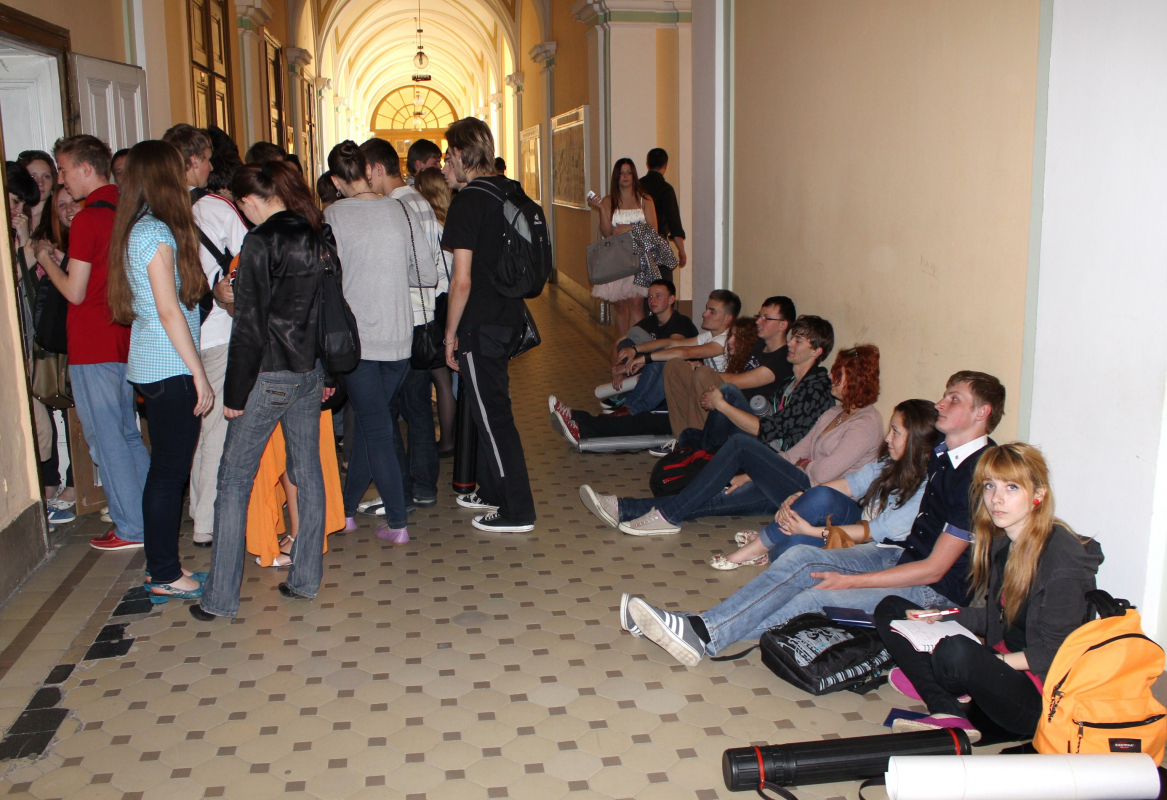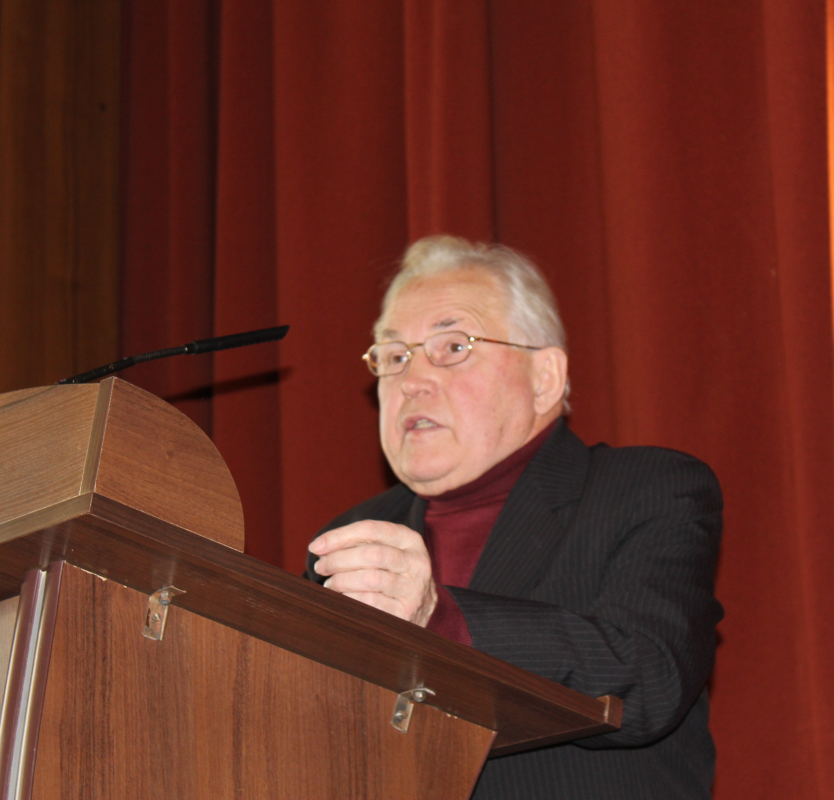It is common knowledge that on December 28, 2016, the Cabinet of Ministers of Ukraine adopted a provision for a new procedure of accruing and paying student scholarships. According to this provision, the scholarship fund for any higher educational institution is limited to 40–45 % of the total number of full-time students, whose tuition fees are paid from the State budget. Earlier this number was 75 % on condition that not fewer than two thirds of such students had to receive scholarships. Now the number of students that receive academic scholarships will decrease.
When those intentions were only declared, Ukrainian students protested against such novelty. However, these protests were not very active and numerous. Government officials explained their decision not only because they wanted to save money but they also hoped to improve the quality of education, to increase students’ motivation to study through raising academic scholarships (ordinary and increased). They also expected to introduce social scholarships for certain categories of students.
From now on, an ordinary (academic) scholarship will amount not to 825 hryvnyas, but 1100, and a scholarship for special achievements in studying – almost 1600 hryvnyas. Increased scholarships (1400 hryvnyas) will be paid to students who pursue certain specialities included in the list of the Cabinet of Ministers. Those, for instance, include «Power Engineering, Electrical Engineering and Electromechanics», «Metallurgy», «Applied Mechanics», «Mathematics», «Physics and Astronomy», etc. The novelty lies in the fact that social scholarships will be paid from the budget of the Ministry of Social Policy of Ukraine, not from the budget of the Ministry of Education and Science.
According to this provision, Lviv Polytechnic Academic Board adopted a Provision for scholarships for undergraduate, postgraduate and PhD students. Scholarships will be granted according to students’ studying rating, as it used to be. The rating figure, according to which first-year students will be granted their scholarships until they take their first exams and credits, is determined on the basis of their competition score on entering the University. The rating figure, according to which students are granted academic scholarships during the next academic semester, is determined by their exam and credit results in the last academic semester according to the institutes, years of studying and every speciality taking into account individual student’s participation in scientific and technical research, public life and sports.
There is a special provision on the rating assessment of students’ achievements. Students’ rating figure is determined according to the following formula: RF = 0.95 * RSS + 0.05 * AP, RSS – semester rating score, AP – additional points within a 100-point scale. In other words, rating score is multiplied by 0.95, and relevant additional points are multiplied by 0.05.
Everything seems to be clear. However, a lot of questions arise. The provision for scholarships is to be implemented by the administration, but it is not a dogma. After this document was adopted, not only journalists have questions.
When the provision was being discussed within the working group, there were proposals to preserve the average score 71 for granting scholarships, although the number of scholarships was limited to 40–45 %. Some people suggested having different average score for different institutes depending on the complexity of studying and specific character of the given institute. Professor Orest Lozynskiy, Head of the Studying Problems Commission of the Academic Board, was an active participant of the working group and took part in the heated debates.
– Professor Lozynskiy, before our conversation I saw Anatoliy Moroz, Vice-Rector for Economic Affairs, Chief Accountant of Lviv Polytechnic. I asked him if there is going to be enough money for 45 % of students. He smiled at me and answered: there is going to be enough! Even for those who have satisfactory grades. Do You share my skepticism?
– I do. At the meetings of the working group, I tried to prove that it is essential to preserve the average score 71 at least for certain specialities (I mean the complexity of disciplines, the number of students pursuing the given speciality). There are institutes where there are a lot of students and a lot of excellent students. There, the 45 % limit can reach the score of 75 or even 85. There may be a situation when a student has top grades and does not receive a scholarship. For example, we had a different situation. Let us say that a student got a satisfactory grade. However, he/she had an opportunity to get an excellent grade in a subject with more credits. So his/her average score reached 71 and he/she received a scholarship. Now we do not know where this 45 % limit can lead – to the average score 62 or 60, and that satisfactory student will have a scholarship. Is that an incentive to study hard? Members of the working group proposed not to be in a hurry to cancel 71 as an average score. Let us retain it for this semester. We will see how other higher educational institutions act, what opinions on this problem will be voiced in mass media, in Internet. It was expected to retain 71 as an average score until summer exam period. However, this proposal was not supported at the meetings of the Academic Board working group.
– I know that there were discussions to limit the number of scholarships to 40 %, not 45 %. What was Your opinion?
– I proposed not to use up all 45 %. We have always practiced leaving a certain percentage from the scholarship fund for various social needs of our students, for instance, to pay them University Academic Board scholarships, Rector Yuriy Rudavskiy scholarships, to finance their trips to various contests and sports competitions, etc. Our Rector Yuriy Bobalo is a kind man. That’s why he decided to take into consideration the opinion of student self-government and students and PhD students union. So it was decided to use all scholarship money permitted by the Cabinet of Ministers.
– I am interested in Your opinion on the problem which, in fact, does not refer to the provision for scholarships. In many well-to-do countries, students do not receive scholarships and have to pay tuition fees. The expression ‘poor student’ is a thing of the past. Nowadays a lot of students who have rich parents can spend their scholarship in expensive bars and cafes in a couple of days…
– It is true that for a lot of such students a scholarship is not an incentive to study hard. This refers to parents with high incomes, especially those working abroad. However, a vast majority of students live rather modestly. In our country, there are too many higher educational institutions in comparison with other countries. They mostly produce not profound knowledge, but diplomas, performing a social function. A child has left school. Where should he/she go? To the army, to the streets, to the job centre? We do not have enough jobs with an adequate salary. In fact, professional education has been destroyed. A lot of school leavers do not have aptitude for higher education. Our job market does not need so many people with higher education at the moment. Government officials and parents are thinking in this way: if children stay in a higher educational institution for 5 years, they might avoid bad influence of the «street», they will not be idle, someone will keep an eye on them and they might even learn something. Obviously it is more convenient for the State to pay scholarships rather than the dole. It is a huge social problem. I do not see a solution to it in the nearest future. There is one more problem. A lot of our students, who have individual schedule at the 4th or 5th year of studying, do not attend lectures. Of course, such higher education is not adequate. They do not study, but work part-time and study part –time. Nevertheless, they are also entitled to scholarships.
– You have great life and teaching experience. Will this 45 % scholarship limit lead to informal relations between students and lecturers?
– It depends on the lecturer’s integrity. I think that after the Revolution of Dignity, the number of lecturers, who expect bribes from students, has decreased. However, if such instances occur, it does not depend on any decrees or provisions. It is a criminal offence, and is the problem of law enforcement bodies.
– I mean not only bribes. Evidently there will be more students who will beg to get a good grade by telling lecturers sad stories about their life…
– This has always existed and will exist. Lecturers do not have hearts of stone. But it should be done without bad intentions. My personal opinion is that you can understand a student if he/she does not play truant and has a desire to study.
***
Since it is about student scholarships, I decided to talk to Bohdan Polishchuk, Head of the University students and PhD students union.
– The provision has been adopted and it needs to be carried out. But, as a journalist, I am interested in the motives of this or that decision. Why did student self-government insisted on cancelling 71 average score limit for granting scholarships?
– That was the opinion not only of the Head of students union or the Head of the board. That was the stand most unions in Ukraine took. Yes, there were discussions. But I would like to remind you here a famous maxim, «If you do not know how to act, act according to the law!» In this case, it is according to the provision of the Cabinet of Ministers. It does not contain such limit. The more students receive scholarships, the better. Apart from other factors, scholarships can decrease the number of students who have to look for some part-time jobs. Thus they can study better. We are grateful to Rector Yuriy Yaroslavovych Bobalo for supporting the opinion of students.
– It is more or less clear with academic scholarships. As far as social scholarships are concerned, I have heard that disabled students, students-orphans did not get into the list of the Cabinet of Ministers…
– First of all, I have to say that the reality of our life, Russian aggression, consequences of the Revolution of Dignity led to the fact that new categories of students, who are entitled to social scholarships, appeared. I mean ATO participants, children of ATO participants, children of those died during the Revolution of Dignity. This also refers to people who have the status of an internally displaced person. On the other hand, since the finances manager of social scholarships changed – the Ministry of Social Policy took over from the Ministry of Education – the provision does not include disabled students, students from families with many children and low-income families. When we tried to find out why these categories are not included into the provision, the government explained that these categories already receive social pensions from the Ministry of Social Policy.
– What about orphaned children?
– Orphaned children receive full allowance from the State.
– At the University Academic Board meeting, You spoke to the directors of institutes about working with students who are entitled to social scholarships. I suppose not all students are aware of their rights…
– The point is that all social scholarships are paid on the basis of student’s application and documents which prove that he/she belongs to a certain social category. Thus it is essential to inform students. This is our objective and we are asking directors of the institutes to help. I believe that in future, students entitled to social scholarships will submit necessary documents to the social security institutions by themselves.
I would also like to get back to academic scholarships. The rating score consists of the semester rating score and additional points according to the scale presented in the provision. It is about students’ research, theses and reports at scientific conferences, publications, victories at certain contests and competitions, their active role in public life and sports, etc. These additional points make up only 5 % of the rating score. Studying is more important. However, additional points can also play a certain part in granting scholarship, although they will be taken into account during the next exam period.
– Do You think that there may be some changes in this provision for scholarships?
– I believe that the government will deal with the question about changes. The results of the winter exam period are being analyzed now. When students receive their scholarships, at the beginning of March, we will be able to see their reaction. It will be interesting for administrators of different levels to analyze it in order to predict all future risks. It is common knowledge that practice is the criteria of truth.
P.S. The author of this article asked almost 30 students from different institutes about their attitude to the new procedure of granting scholarships. Most of them were careful in their evaluation of this novelty. They said that in the past, a student was satisfied with 71 rating score and did not care about anything else because he/she was entitled to a scholarship. Now you have to study hard to compete with your groupmates and get into those 45 % entitled to a scholarship. And, as we know, competition motivates progress.



